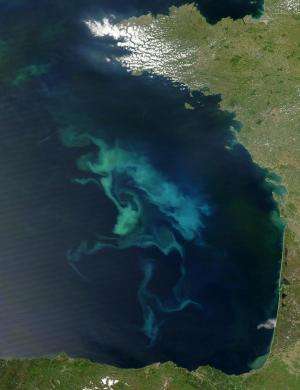Phytoplankton and zooplankton biomass will decrease 6 and 11 percent due to climate change

It is estimated that ocean temperature warming will cause phytoplankton and zooplankton biomass to decrease by 6 percent and 11 percent respectively by the end of the century. A lower amount of these two main elements in the marine food web could reduce fish biomass in certain regions. These are some of the main conclusions drawn by research led by Azti-Tecnalia within the European MEECE project and recently published in the Global Change Biology journal.
Sea surface temperature is expected to increase 2 C on average globally by 2080-2100. Some of the consequences of this increase include changes in ocean circulation and higher water column stratification, thus affecting the nutrient availability for the growth of marine phytoplankton.
The research team led by Azti-Tecnalia points out the effects to primary production (phytoplankton mass produced annually by photosynthetic single-celled organisms that are suspended in the ocean), and to secondary production (zooplankton biomass, made up of small animal organisms that feed mainly on phytoplankton and which fish feed on).
Globally, it is estimated that the sea temperature rise will cause phytoplankton and zooplankton biomass to decrease by 6% and 11% respectively. This suggests that there will be a negative amplification of climate change, which will spread through the marine food web, i.e. zooplankton biomass will decrease more than phytoplankton. This process will take place mainly in tropical oceans, which cover 47% of the global ocean surface.
Differences by region
Phytoplankton and zooplankton reduction, however, will affect different regions in different ways. In the seas in Central and Southern Europe (North Sea and temperate Northeast Atlantic), higher thermal stratification of the ocean water layers and, consequently, a lower presence of nutrients for phytoplankton to grow, will reduce primary production; and in the Baltic, Barents and Black Sea phytoplankton production is expected to increase.
Azti-Tecnalia researcher Guillem Chust, leader of the scientific work and main author of the paper, says that "in the ocean regions that lose more phytoplankton and zooplankton biomass, that is, with a negative amplification, fish biomass may also decrease dramatically, especially pelagic species (i.e. those living the water column, excluding the seabed)".
"Climate regulation will also be affected negatively by the primary and secondary production decrease globally," Chust explains, "because, as there will be less phytoplankton, absorption of CO2 from the atmosphere by the oceans will be lower, as plankton is responsible for half of the planet's photosynthetic activity. This in turn will reduce the ocean's capacity to regulate the climate".
More information: Chust, G. , Allen, J.I., Bopp, L. , Schrum, C., Holt , J., Tsiaras, K., Zavatarelli, M, Chifflet, M., Cannaby, H., Dadou, I., Daewel, U., Wakelin, S.L., Machu, E. , Pushpadas, D. , Butenschon, M., Artioli, Y., Petihakis, G., Smith, S., Garcon, V., Goubanova, K., Le Vu, B., Fach, B.A., Salihoglu, B., Clementi, E. and Irigoien, X. 2014. "Biomass changes and trophic amplification of plankton in a warmer ocean". Global Change Biology. doi.org/10.1111/gcb.12562
Journal information: Global Change Biology
Provided by Elhuyar Fundazioa





















